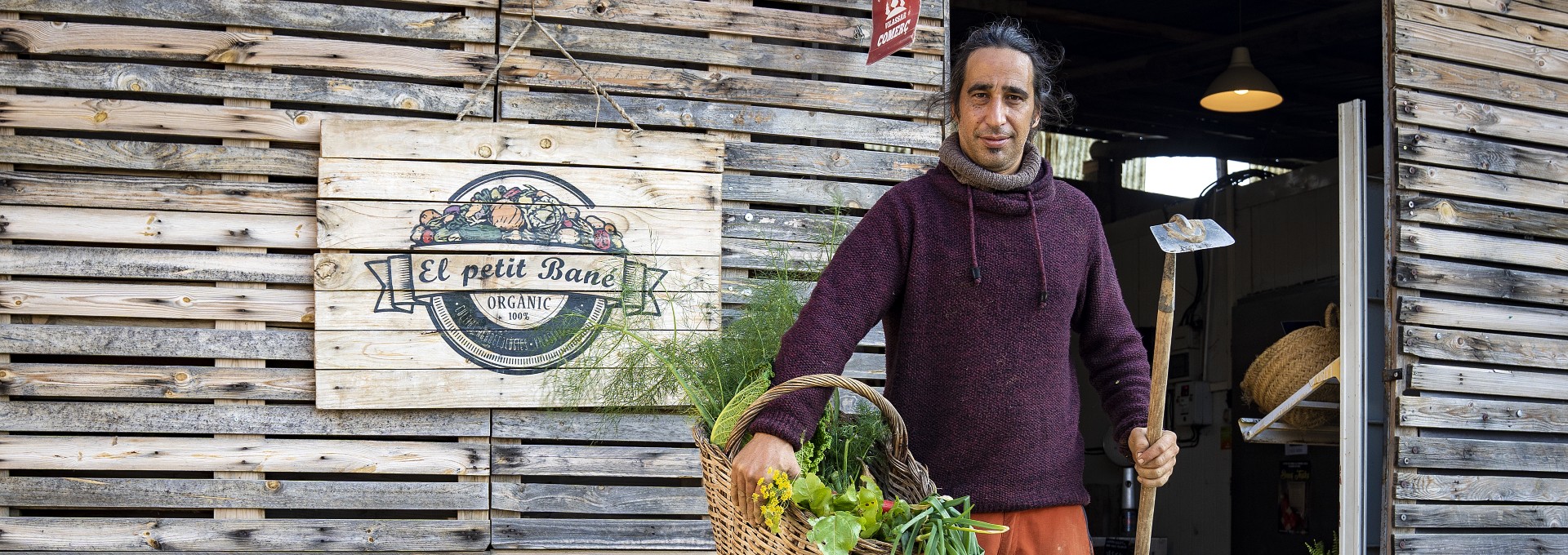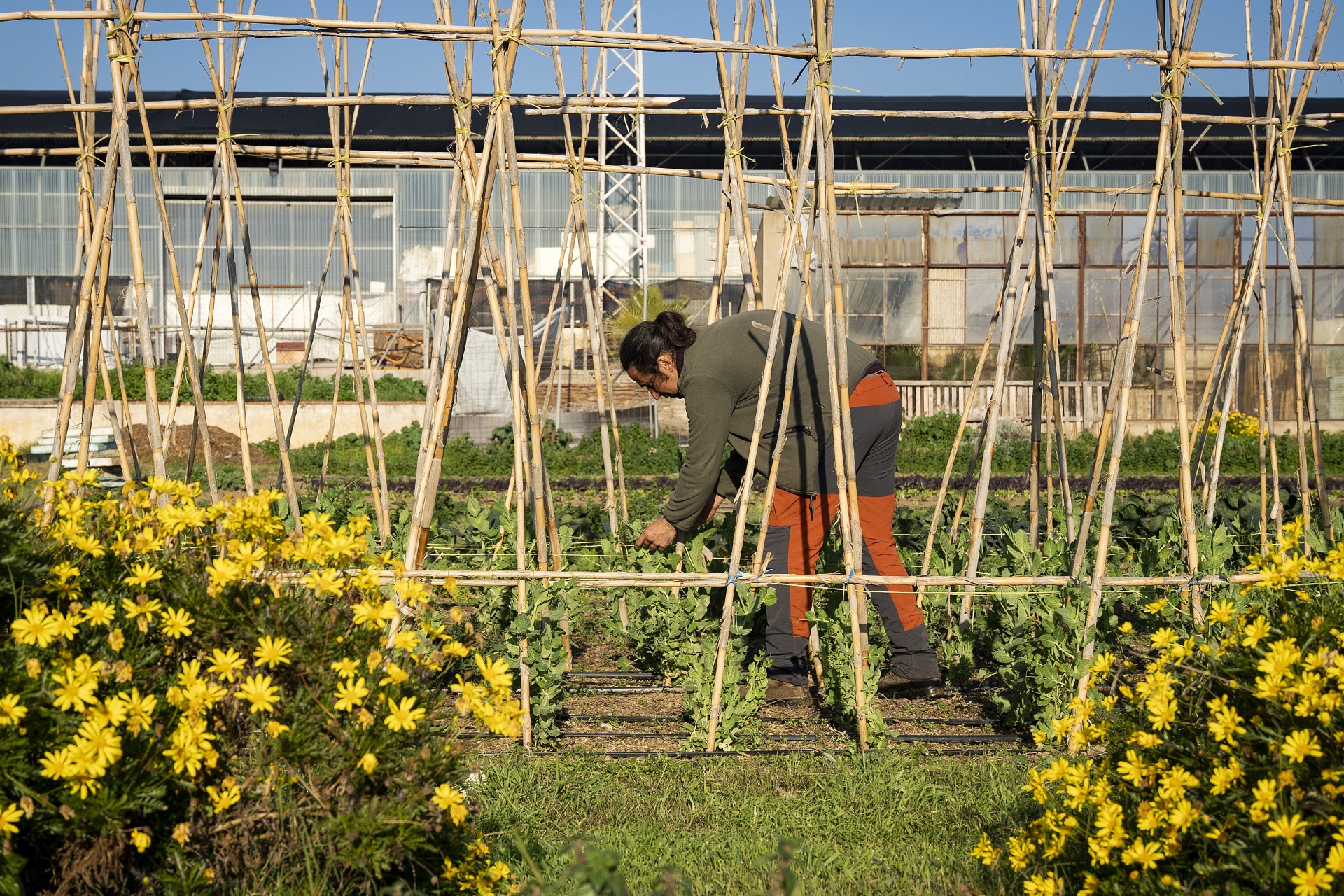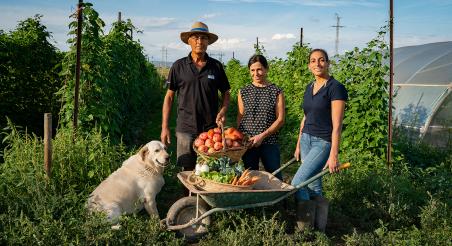Roger Solé (Barcelona, 1977) is a farmer who enjoys educating people about his work. His enthusiasm for education stems from the fact that he worked as a social educator in centres for unaccompanied minors until 2013, the year in which he founded his farming business, El Petit Bané. Roger is the soul of the project, as attested by the instructive and funny videos he enjoys posting on his social media accounts, packed with anecdotes and practical examples.
We chat to this energetic, inquisitive farmer as we stroll around plots overflowing with vegetables, flowers and life. Roger says that his mind is always racing and that he has no truck with whingeing farmers; he prefers to adopt an optimistic outlook and come up with solutions to the constant challenges of his profession.
Set in an area where an abundance of flower and plant crops are cultivated, and where rental prices for agricultural land are high, El Petit Bané produces seasonal vegetables by means of rotating crops: leafy vegetables, root vegetables and flower vegetables, as well as other so-called flex crops. A water supply for irrigation purposes is guaranteed thanks to a water mine or underground gallery that passes below the farm, bringing water from the Montseny area. The farm currently employs four people to work the land and six people to run the warehouse area, within a sales and distribution company. Several young Africans also work on the project. Roger always tells them that he’ll teach them Catalan, while learning the Mandinka language himself. He believes that if they want to prosper and sell in the market, it’s essential for them to know the language.
El Petit Bané sells its produce through several channels. It has a point of sale on the farm itself, it sells directly at two farmers’ markets, it prepares baskets of produce for consumer groups and cooperatives, it supplies restaurants and it exchanges produce with other farmers.
A curiosity that few people are aware of is that the Spanish composer, pianist and teacher Enric Granados spent a few summers on the farm in the 1900s and 1910s, staying in a little cottage known as La Tartaneta. Not long after his visit in 1915, he left for New York, where he premiered his Goyescas opera.
What are the origins of this agricultural project by the sea, in the heart of the Maresme area?
I’m a social educator and for a long time I worked in Barcelona in centres for unaccompanied minors. I was perfectly happy in my job and good at it, but it involved working weekends. When our children arrived, I wanted to change my life in order to spend more time with the family on Saturdays and Sundays. I wanted to be with my children!
So I decided to devote myself to farming, a hobby I’d enjoyed since childhood. I entered into a partnership with another farmer, Francesc Gadea, and in 2013 we started cultivating a half-hectare field. We’ve gradually expanded our growing area and now we cultivate the entire farm. I split the harvest with Francesc. We share resources and enjoy innovating and learning together.
When I started out, I talked to various local farmers to find out what crops were planted here, and they offered me plenty of tips: “For Saint Joseph’s Day [19 March], plant this; for Saint John’s Day [23 June], plant that.” They also explained the importance of moon phases. And then they advised me to take the notebook in which I’d written everything down, tear it up and start again, because with climate change, “everything’s going to shit!” This year, with the five consecutive heat waves we’ve had, imagine how tough we’re finding it!
Why did you decide to name the business El Petit Bané?
When we started planning what name to give the farm, we realised that throughout the Vilassar de Mar area, the historical names of houses had been maintained: Cal Vila, Cal Canyelles, etc. The wealthy people who originally lived in these houses were known as “black feet”, while those of us who arrived from Barcelona in the 1970s and 1980s were referred to as “beetlers”. This nickname arose from the Colorado beetle plague that affected local crops at that time, coinciding with the “plague” of holidaymakers that travelled to Vilassar from the big city.
The thing is, I originally come from a village near Tàrrega called Verdú, and I remembered that the name of my father’s house there was Can Bané. I decided to pay tribute to my paternal family, as my father had passed away. The “Petit” part of the name comes from the fact that my father was the youngest sibling and that I’m the youngest of all the cousins.
Now that a few years have gone by since you made the switch to farming, what do you enjoy most about the profession?
Being a farmer is an extreme sport and that’s fine by me. What motivates me the most is striving to adapt to the challenges that come my way, such as when a pump breaks down or when a hot or cold spell arrives. If you want a quiet job, farming’s not for you. There’s always some problem out in the fields: if it’s not the garlic, it’s the onions. Two and two never make four, and that’s why everyday life is never boring. Another aspect I really like is being able to share my knowledge with people who want to become farmers. I love giving them advice and offering them help.
«If you want a quiet job, farming’s not for you» Roger Solé
At El Petit Bané you grow organic produce and explore new ways of working the soil to preserve it and guarantee sustainable food production. How do you apply innovation in your company?
Technicians from the Plant Protection Association carry out checks here and advise us. We’re activating soil microbiology and seeing positive results. We add plant substrates, along with an activator that regenerates microorganisms to boost the amount of life in the earth. Soil quality is crucial for the success of this approach.
To prevent the spread of pests, we grow our produce in small sectors rather than extensive crop areas. We have composting areas where we deposit plant waste brought to us by gardeners (waste from poplars, London planes and pines, etc.). Once generated, we experiment with the compost in different areas to see where the best results are achieved. We also use organic manures.
There’s currently a trend towards regenerative agriculture, which involves not working the land but adding organic matter to the soil. We like this approach, but we have a handicap, which is that we pay rent for our land. This means we need to grow crops with a fairly fast cycle in order to have liquidity and be able to exchange produce with other farmers.
«Soil quality is crucial for the success of this approach» Roger Solé
Do you specialise in any particular varieties of vegetable garden produce?
We plant vegetables that aren’t typically available in the market, such as kale, which has now become fashionable. Not long ago, other farmers scoffed at kale and wouldn’t grow it, whereas now they ask us how we go about it. We also grow white aubergines, fennel, different coloured beetroot, three varieties of mustard plant and various other vegetables. In areas such as ours, surrounded by greenhouses, we try to promote biodiversity by growing as many varieties as possible and planting trees. We open the farm up to customers and schools that request visits in order for them to see this innovation.
In addition to our own crops, we sell produce grown by other farmers and we buy produce off a distribution company called Hortec and from the Biolord cooperative. I work a lot with Francesc Gadea and El Mosaic.
Making a living from farming involves a lot of juggling. The sales aspect is one ball, climate change is another, and then there’s the water issue. There are good years and bad years, and you have to juggle all these balls!
«We plant vegetables that aren’t typically available in the market, such as kale, which has now become fashionable» Roger Solé
Apart from the farm shop, where else can customers find your produce? What other points of sale do you have?
We sell our produce through several outlets: direct sales, the sale of baskets for groups, consumer cooperatives and restaurants, and exchanges with other farmers. If we have surplus produce, we take it to Hortec and Biolord.
We prepare around 150 vegetable baskets every week, of which 50 go to people suffering financial hardship who are registered with the Neighbourhoods Plan of Barcelona City Council. It’s a great way to give people the chance to try vegetables that they wouldn’t otherwise have access to.
Being located so close to Barcelona offers plenty of sales opportunities. Apart from our stall at the Sunday market in Vilassar de Mar (where, by the way, we’re the only ones who sell organic produce), we’ve got a stall at the farmers’ market in Barcelona’s La Sagrera neighbourhood.
How did the Covid-19 pandemic affect your decision to opt for agroecology and local food systems? Did you notice any changes in the demands of consumers?
Yes, during the pandemic people supported farming and showed plenty of awareness. They demonstrated a high degree of willingness and we have to stay true to this vision. Generally speaking, farmers are undervalued by society, but the younger generations look after their health, watch what they eat and appreciate us... I can see light at the end of the tunnel! I think we need to change our mindset and be more positive.
«Generally speaking, farmers are undervalued by society, but the younger generations look after their health, watch what they eat and appreciate us... I can see light at the end of the tunnel! I think we need to change our mindset and be more positive» Roger Solé
Do those closest to you – your friends and family – provide the support you need for your project?
Friends and relatives help me out, but they don’t show enough awareness, since they still shop for fresh produce in supermarkets. Basically, we should go back to doing what my 85-year-old mother used to do: buy our vegetables at the Sunday market in the square. However, we’re happy because we have a loyal base of customers who buy our baskets and with whom we’re in constant contact.
In theory, your profile matches the concept of “new farming”, which brings together both people who are new to the sector and others who, despite coming from farming stock, share «an approach to producing and selling food and relating to their local environment that’s based on the components of the new agrosocial paradigm»; that is, values such as localised food production, increased agrodiversity, environmental conservation, cooperation, innovation, autonomy and social commitment. Does that sound like an accurate description of how you live and work?
As far as our work approach is concerned, at El Petit Bané we follow the anarchist principle of striving to be self-sufficient and getting together with others who are also self-sufficient. We collaborate with other entities in various ways, but we’re not exclusively tied to a single network. The reason for this is that networks tend to adopt an approach based on the cooperative model and it takes a long time to make decisions. We’re more about action and less about assemblies. Many cooperative networks make joint purchases to save costs, but don’t sell their produce on a collective basis. We advocate selling together in order to optimise efforts. Although we’re not affiliated to any established networks, we’re always collaborating with farmers who are members of them. We want to avoid making the mistake of farmers in years gone by, when families were all at loggerheads.
After the 2008 economic crisis, a new batch of young people joined the farming profession, which led to a boom in small-scale farming in this part of the Maresme area. But now we’ve entered a period of decline and we’re concerned about generational renewal. The vast majority of farmers are between 60 and 70 years old, and their kids don’t want to take over the reins. We see big companies trying to purchase their land, which means the land is in fewer hands.
Do you have any requests to put to the public authorities or to farming or cooperative networks?
How can the public authorities help us? As I mentioned before, one example would be the vegetable baskets initiative of the Neighbourhoods Plan. Another measure would be to grant farmers more rights than ordinary retailers when inviting tenders for market stalls. It would also be positive to stipulate that 40% of the vegetables cooked in school canteens, care homes and hospitals must be organic and local. The authorities could also help us with logistics, a perennial problem for farmers.
We don’t believe that subsidising farming is the best option, but we could do with some help in certain aspects. We’re increasingly bogged down with administrative tasks such as submitting the Single Agricultural Declaration (DUN) or the Declaration of the Management of Livestock Manure and Other Nitrogenous Fertilisers (DAN), filling in the logbook, certificates, etc. Sometimes you spend more time in front of a computer screen doing paperwork than working out in the fields, which is where you’d rather be.
As someone keen to find new solutions, what have you learned over the course of your career in terms of the feasibility of a farming business?
Having a single customer is no good. You also have to be able to multitask, covering every base: farming, marketing, logistics, warehousing, accounting, etc. And you have to network and be strongly commercially minded.
At the same time, we’re looking for new funding channels and ways to make the numbers add up. If growing peas or tomatoes didn’t work out well for us last year, we have to reinvent ourselves. That’s why we open up the farm and offer tastings of our vegetables to make ourselves known. Otherwise, what happens? Well, in the summer, when the production of vegetables reaches its peak, people go away on holiday. Everyone’s off, so you have to plan ahead and work out what you’re going to live on over the two summer months.
«You have to network and be strongly commercially minded» Roger Solé
One of the reasons you switched career was your family. You’ve got a 10-year-old son and a 13-year-old daughter. Do you think about their future when you’re working?
Yes, in two ways. Obviously, I grow vegetables to ensure they eat well, but I also think about whether I’d like them to continue this project. I try to explain to them that as farmers we perform many functions; it’s like running a house, where you have to cook, do the laundry, etc. I teach them that in this sort of environment, you’ve got to be patient and collaborate, and that a crooked pepper is just as good as a straight one. I like to teach them where food comes from and pass on a series of values. But eventually they’ll make their own minds up about what they want to do.
On the surface, they don’t seem to be particularly interested in farming, but when their friends come round, I can see that they’ve been listening to me. They show their friends stuff, they let them taste the peas, and I feel like we’re not doing too badly. I like the fact that they help out on the farm and get to see the many ways of managing a vegetable garden.
Do you have any significant culinary memories from your childhood? Is there a particular dish or food that’s stayed with you throughout your life?
Swiss chard. My mother never gave up trying to get me to eat this vegetable, but although we grow some spectacular Swiss chard at El Petit Bané, I still don’t like it. On the other hand, I now enjoy eating peppers and aubergines, which I couldn’t stand as a child either. It’s because I cook them differently. Now I work with chefs who teach me new recipes, such as using cauliflower as flour to make pizza bases. It’s delicious! Whereas if I make cauliflower in béchamel sauce, which is a recipe I remember from my childhood, I don’t like it. It’s all about finding ways to cook ingredients so that you like them. I’ve also discovered that fresh, raw broccoli stalks are wonderful. And the kids love them!
How would you define living the good life?
Being self-sufficient and living off the things I like. For me, being a farmer allows me to live in harmony with nature and relate to others, which gives me a feeling of great wellbeing. If disaster struck, I could take some seeds and start again somewhere else, because I know the profession. Despite the constant demands of the authorities, being a farmer allows me to be more self-sufficient.
— BCN Smart Rural Editorial —




